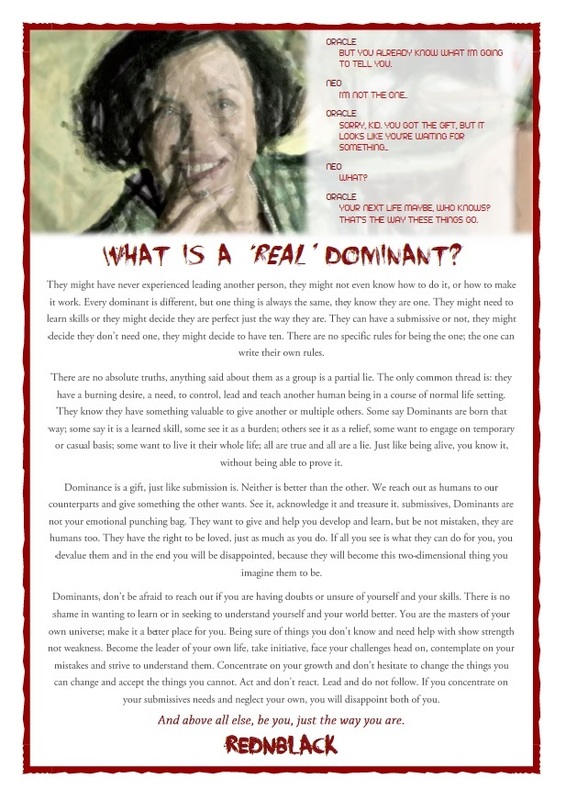I have encountered this meme on FB the other day, which depicted a man, dressed in black leather, standing above a kneeling naked woman. The caption saying:
*The wannabe Dom thinks only of themselves, while the Dominant thinks only of their submissive.*
*The wannabe sub thinks only of themselves, while the submissive thinks only of their Dominant.*
Aside from the fact that absolutes don’t really apply to human beings, I think that dominance and submission have very little to do with this kind of simplicity.
People arrive at this lifestyle with histories of experiences, preconditioned emotional responses or as some call it ‘baggage’. We all have it, by the way, but only few are consciously aware of their own. We have lived, loved, suffered, despaired, got back up, etc. At some point in time we have watched or read or experienced something that got us interested. That something ‘just sounded right’, or in other words triggered a sense memory of lack and its possible fulfilment. This is at the basis of it all – our own fulfilment. Regardless of what it is that we believe might bring that fulfilment, whether dominating or submitting, it is ultimately our own fulfilment that we all seek.
Giving and receiving is a maga issue in the human psyche. Everything we do, everything we are, is a play on giving and receiving. We work (giving), we earn money (receiving), we provide emotional labour and receive emotional labour/gifts/money/status/etc., we perform oral service, and receive appreciation/love/acceptance, etc.
Sometimes however, because of our early experiences, our emotional responses to giving and receiving get a bit confused. Giving becomes easier than receiving, less gilt, shame, embracement, etc. receiving requires a higher level of self-acceptance and love. In other words, we need to love ourselves to such a degree that we are able to recognize that we are deserving and worthy of the good things that people wish to give us. These include love, pleasure, money, emotional labour, or in some cases just space in their lives. This kind of self-love and appreciation takes a great deal of self-development, which some of us are still doing and some are ignoring (no judgement).
In relationships which are not acknowledged as power exchange based, which develop ‘organically’, we begin with unrestricted giving, whatever giving means for each of us. At some point, however, consciously or unconsciously we expect to receive. When we feel that we haven’t received the same amount of whatever receiving is for you, we become resentful and frustrated. We obviously don’t communicate it to the other person, in the majority of cases we aren’t even aware of the skewed balance, or its reasons. We just do the passive aggressive dance, or just aggressive, or leave. Realizing what we want and asking for it feels unfulfilling or missing the point somehow. Gifts are supposed to come from the heart; if we need to ask for them, we feel that the other is doing us a favour, which for some feels humiliating.
When we imagine a power exchange relationship, we imagine being forced to receive, without the need to ask for it. Both dominants and submissives hope that in such a relationship the gifts will come without the feelings of guilt or shame, (unless in play of course). We all yearn for such a magical transformation of universal laws that our suffering, frustration and resentment will disappear. We yearn and dream of a counterpart who will take these feelings away, by giving us what we want without us needing to ask. In other words, we hope for a relationship in which our counterpart will consider giving as taking and taking as giving.
In this imaginary scenario the statements above make perfect sense. In reality these statements should read:
*A real Dominant will teach us to love ourselves enough to be able to accept love, appreciation, pleasure, forgiveness etc.*
*A real submissive will teach us the same.*
And when we have learnt this lesson, we move on, forward, away and remember the person who has changed us forever, for the better.






 RSS Feed
RSS Feed
